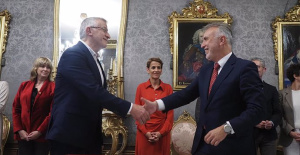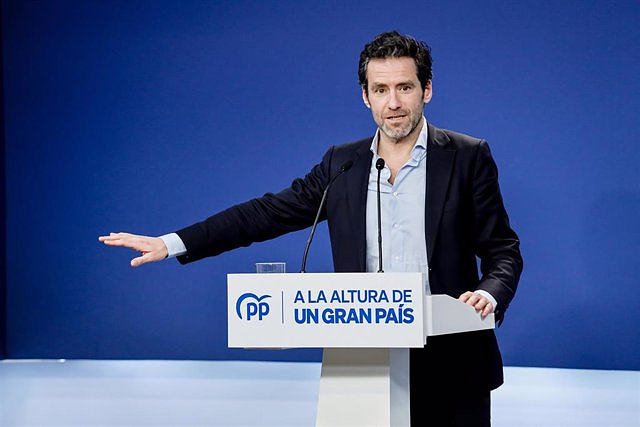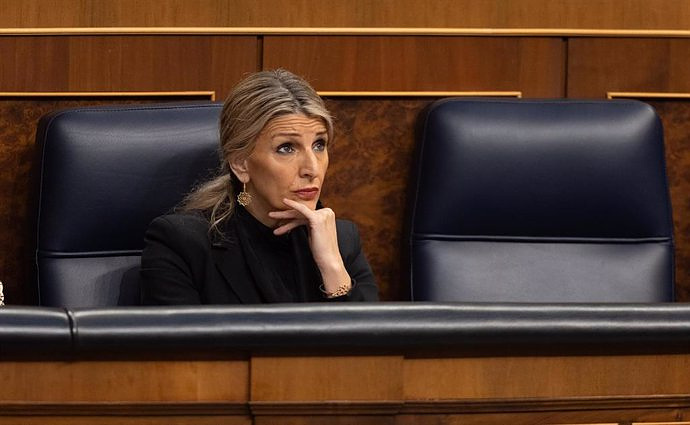He says that there is legislation on abortion that "has surpassed" the one that the PP appealed and sees a ruling of the TC 12 years later as "striking"
MADRID, 18 Ene. (EUROPA PRESS) -
The spokesman for the PP campaign committee, Borja Sémper, has described the vice president of Castilla y León, Juan García-Gallardo (Vox) as "irresponsible" for provoking a "ghost request" from the Government of Pedro Sánchez in the face of a "non-existent" decision. in relation to the protocol of pregnancies in this region.
After also charging against the Executive of Pedro Sánchez for "taking advantage" of this to "divert attention" from his own problems, such as the law of only 'yes is yes', Sémper has affirmed that "what Castilla y León and Spain need most At this moment it is stability, good sense and governments, also vice presidents, that dedicate themselves to dealing with the real problems of the people and not to tarnish or generate fires".
When asked if it makes sense for PP and Vox to maintain the Government of CyL after this crisis due to the measures on abortions, Sémper has indicated that "what does not make sense" is what has happened these days and is "a reflection of the current state of politics in Spain", which moves "between simulation and partisan practice".
In an interview in RNE, which has been collected by Europa Press, Sémper has criticized that the vice president of Castilla y León, with a "very singular and particular" profile, has announced measures for "those that have no competition", that "do not exist " and it is also "publicly corrected" by the regional president.
At the same time, he has censured that the Government of Spain "take advantage of the opportunity and deploy a kind of strategy that begins by sliding the possible application of article 155 of the Constitution" against the CyL Board "nothing more and nothing less", with the threat of a possible appeal for unconstitutionality against "something that does not exist". In his opinion, it is "a frivolous strategy" on an issue that is "extremely sensitive."
"An irresponsible vice president who causes a phantom requirement in the face of a non-existent decision on the part of the Government, who takes the opportunity to divert attention from the serious problems that the Government itself is facing," he declared, to criticize the "tactical" interests and " part" in which politics moves at this time.
Asked again if Alfonso Fernández Mañueco should dismiss his vice president and if he would break that agreement, he has indicated that only the president of the CyL Board has "competence" to make that decision and has stressed that what this region needs is "stability " and "sensible", taking care of the problems of the citizens.
In this sense, he stressed that Vox "is a bargain for the Government" and both "feed back". "What we need is stability and we are going to see what happens in the coming weeks and in the coming months," he said, calling for "responsibility from all" political leaders.
Faced with the possibility that the PP needs Vox to govern after the elections, Sémper has said that the PP's horizon is not to "look" at Santiago Abascal's party or other formations but to form "a large enough majority" to govern without others matches. In his opinion, "this is possible, it can happen" and it would give rise to a government "much more effective and capable of facing the problems" of Spain.
"We are afraid of fleeing from the Sánchez model, that you put into the Government someone who has another agenda and with whom you are hitting every day, and in which you depend on parliamentary support that has its own agenda, legitimate but that of the independentistas , who do not look at the governability of the country but are in a particular key", he explained.
Feijóo has indicated that the PP wants to "widen" the space of the PP within the "centrality" and has opted to do it from the "bottom" but also with "better forms", recovering "good manners, respect for the adversary and not turn him into an enemy", questions that, in his opinion, "never go out of style".
Given the fact that the Constitutional Court is going to study in February the appeal that the PP presented 12 years ago against the abortion law approved by the Government of José Luis Rodríguez Zapatero, Sémper has said that "it is striking" that the court of guarantees "has not been able to express its position" these years on this matter. "It's a bit flashy", he has abounded.
On this point, he has indicated that there is legislation already in Spain that "has surpassed that which was the subject of an appeal" by the PP. "12 years later, we have the feeling that the debate is over," he assured, to recall that the PP governed Spain for eight years with Mariano Rajoy, "four of them with an absolute majority and the current legislation did not change."
Sémper has recognized that there are aspects of this law that the PP "does not like", such as the fact that girls under 16 and 17 years of age can abort without parental consent. "But the law of deadlines at the moment as it is proposed is not an open debate in Spain and that is how we value it," he added.
Regarding the demonstration that dozens of associations have called this Saturday in Madrid to protest the policies of the Sánchez government, Sémper has indicated that leaders of his party will attend, but he has not specified who. In his case, he has said that he "has no intention" of going and has shown himself to be more in favor of doing politics in institutions than on the street, although he has admitted that throughout his life he has gone to many demonstrations.
Immediately afterwards, he has expressed his respect for this type of mobilization because there is a part of Spanish society that is "very concerned" about what they are seeing. "It is within the norm and the usual dynamics in Spain, for this civil society to call rallies or demonstrations to express their discomfort," he indicated, to insist that the PP "understands it" and that is why it will be present.
Given the fact that the Prosecutor's Office has appealed the order of Judge Pablo Llarena and asks to prosecute the former president of the Generalitat Carles Puigdemont for public disorder, Sémper has affirmed that with the penal reform to repeal sedition and modify embezzlement, "those who were sentenced" want to "benefit from their power and ability to influence the President of the Government".
After assuring that this is "truly serious", he regretted that the Penal Code is "at risk" of "arithmetic interests" that "benefit" the President of the Government. "It seems to us a small scandal," he emphasized, adding that "it is no less serious to use public money to develop a public pro-independence project than to buy a Ferrari or a house on the beach."
The spokesman for the PP campaign committee has assured that the agenda of the PSOE and Unidas Podemos government is not that of the "general interests of Spain" but "an agenda mediated by the particular interests of the groups that support it."
Sémper has referred to the so-called 'only yes is yes' law and has criticized the fact that there is no "rectification" or "humility" on the part of the Government of Pedro Sánchez but a "flight forward" with this rule that, in his opinion , It's inexplicable".
He has also alluded to "institutional deterioration" and has warned of the "ennui and anger" on the street about politics. "There is exhaustion about the state of the political thing in Spain that I think the President of the Government should be particularly concerned about," he declared, to point out that what has happened in the last three years as Executive of PSOE and Podemos has a lot to do with it. , which have given "very few uplifting moments".

 Exploring Cardano: Inner Workings and Advantages of this Cryptocurrency
Exploring Cardano: Inner Workings and Advantages of this Cryptocurrency Seville.- Economy.- Innova.- STSA inaugurates its new painting and sealing hangar in San Pablo, for 18 million
Seville.- Economy.- Innova.- STSA inaugurates its new painting and sealing hangar in San Pablo, for 18 million Innova.- More than 300 volunteers join the Andalucía Compromiso Digital network in one month to facilitate access to ICT
Innova.- More than 300 volunteers join the Andalucía Compromiso Digital network in one month to facilitate access to ICT Innova.-AMP.- Ayesa acquires 51% of Sadiel, which will create new technological engineering products and expand markets
Innova.-AMP.- Ayesa acquires 51% of Sadiel, which will create new technological engineering products and expand markets The Ibex 35 signs its best session of the year with an increase of 1.7% and recovers 11,000 points
The Ibex 35 signs its best session of the year with an increase of 1.7% and recovers 11,000 points RELEASE: Applied Intuition and Audi Partner on Unified AD Launch Solution
RELEASE: Applied Intuition and Audi Partner on Unified AD Launch Solution The European Parliament supports the new fiscal rules adapted to the situation by country
The European Parliament supports the new fiscal rules adapted to the situation by country Agreement between the Government and Navarra to protect traffic competition in the community after the annulment of the Supreme Court
Agreement between the Government and Navarra to protect traffic competition in the community after the annulment of the Supreme Court How Blockchain in being used to shape the future
How Blockchain in being used to shape the future Not just BTC and ETH: Here Are Some More Interesting Coins Worth Focusing on
Not just BTC and ETH: Here Are Some More Interesting Coins Worth Focusing on Looking for video games that value the neighborhoods of Valencia
Looking for video games that value the neighborhoods of Valencia UPV researchers improve the efficiency of air conditioning systems using a geothermal heat pump
UPV researchers improve the efficiency of air conditioning systems using a geothermal heat pump València is committed to citiverse and smart tourism to be "the reference technological hub of the Mediterranean"
València is committed to citiverse and smart tourism to be "the reference technological hub of the Mediterranean" Valencia displays its "innovative and technological potential" at the Emerge Americas event in Miami
Valencia displays its "innovative and technological potential" at the Emerge Americas event in Miami A million people demonstrate in France against Macron's pension reform
A million people demonstrate in France against Macron's pension reform Russia launches several missiles against "critical infrastructure" in the city of Zaporizhia
Russia launches several missiles against "critical infrastructure" in the city of Zaporizhia A "procession" remembers the dead of the Calabria shipwreck as bodies continue to wash up on the shore
A "procession" remembers the dead of the Calabria shipwreck as bodies continue to wash up on the shore Prison sentences handed down for three prominent Hong Kong pro-democracy activists
Prison sentences handed down for three prominent Hong Kong pro-democracy activists ETH continues to leave trading platforms, Ethereum balance on exchanges lowest in 3 years
ETH continues to leave trading platforms, Ethereum balance on exchanges lowest in 3 years Investors invest $450 million in Consensys, Ethereum incubator now valued at $7 billion
Investors invest $450 million in Consensys, Ethereum incubator now valued at $7 billion Alchemy Integrates Ethereum L2 Product Starknet to Enhance Web3 Scalability at a Price 100x Lower Than L1 Fees
Alchemy Integrates Ethereum L2 Product Starknet to Enhance Web3 Scalability at a Price 100x Lower Than L1 Fees Mining Report: Bitcoin's Electricity Consumption Declines by 25% in Q1 2022
Mining Report: Bitcoin's Electricity Consumption Declines by 25% in Q1 2022 Oil-to-Bitcoin Mining Firm Crusoe Energy Systems Raised $505 Million
Oil-to-Bitcoin Mining Firm Crusoe Energy Systems Raised $505 Million Microbt reveals the latest Bitcoin mining rigs -- Machines produce up to 126 TH/s with custom 5nm chip design
Microbt reveals the latest Bitcoin mining rigs -- Machines produce up to 126 TH/s with custom 5nm chip design Bitcoin's Mining Difficulty Hits a Lifetime High, With More Than 90% of BTC Supply Issued
Bitcoin's Mining Difficulty Hits a Lifetime High, With More Than 90% of BTC Supply Issued The Biggest Movers are Near, EOS, and RUNE during Friday's Selloff
The Biggest Movers are Near, EOS, and RUNE during Friday's Selloff Global Markets Spooked by a Hawkish Fed and Covid, Stocks and Crypto Gain After Musk Buys Twitter
Global Markets Spooked by a Hawkish Fed and Covid, Stocks and Crypto Gain After Musk Buys Twitter Bitso to offset carbon emissions from the Trading Platform's ERC20, ETH, and BTC Transactions
Bitso to offset carbon emissions from the Trading Platform's ERC20, ETH, and BTC Transactions Draftkings Announces 2022 College Hoops NFT Selection for March Madness
Draftkings Announces 2022 College Hoops NFT Selection for March Madness



























